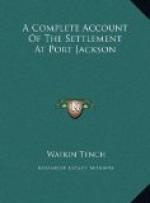But Baneelon, though haughty, knew how to temporize. He quickly threw off all reserve; and pretended, nay, at particular moments, perhaps felt satisfaction in his new state. Unlike poor Arabanoo, he became at once fond of our viands, and would drink the strongest liquors, not simply without reluctance, but with eager marks of delight and enjoyment. He was the only native we ever knew who immediately shewed a fondness for spirits: Colbee would not at first touch them. Nor was the effect of wine or brandy upon him more perceptible than an equal quantity would have produced upon one of us, although fermented liquor was new to him.
In his eating, he was alike compliant. When a turtle was shown to Arabanoo, he would not allow it to be a fish, and could not be induced to eat of it. Baneelon also denied it to be a fish; but no common councilman in Europe could do more justice than he did to a very fine one, that the ‘Supply’ had brought from Lord Howe Island, and which was served up at the governor’s table on Christmas Day.
His powers of mind were certainly far above mediocrity. He acquired knowledge, both of our manners and language, faster than his predecessor had done. He willingly communicated information; sang, danced, and capered, told us all the customs of his country, and all the details of his family economy. Love and war seemed his favourite pursuits; in both of which he had suffered severely. His head was disfigured by several scars; a spear had passed through his arm, and another through his leg. Half of one of his thumbs was carried away; and the mark of a wound appeared on the back of his hand. The cause and attendant circumstances of all these disasters, except one, he related to us.
“But the wound on the back of your hand, Baneelon! How did you get that?”
He laughed, and owned that it was received in carrying off a lady of another tribe by force. “I was dragging her away. She cried aloud, and stuck her teeth in me.”
“And what did you do then?”
“I knocked her down, and beat her till she was insensible, and covered with blood. Then...”
Whenever he recounted his battles, “poised his lance, and showed how fields were won”, the most violent exclamations of rage and vengeance against his competitors in arms, those of the tribe called Cameeragal in particular, would burst from him. And he never failed at such times to solicit the governor to accompany him, with a body of soldiers, in order that he might exterminate this hated name.
Although I call him only Baneelon, he had besides several appellations, and for a while he chose to be distinguished by that of Wolarawaree. Again, as a mark of affection and respect to the governor, he conferred on him the name of Wolarawaree, and sometimes called him ‘Beenena’ (father), adopting to himself the name of governor. This interchange we found is a constant symbol of friendship among them*. In a word, his temper seemed pliant, and his relish of our society so great, that hardly any one judged he would attempt to quit us, were the means of escape put within his reach. Nevertheless it was thought proper to continue a watch over him.




